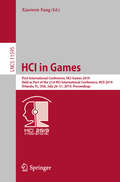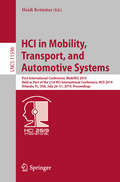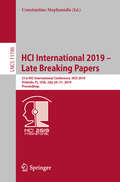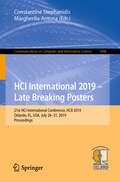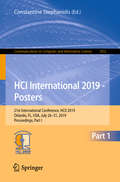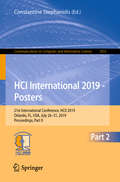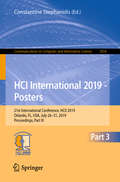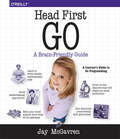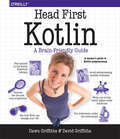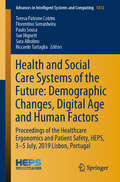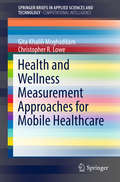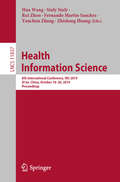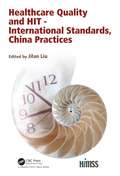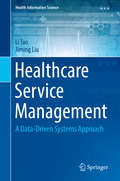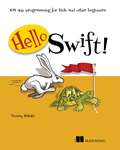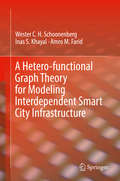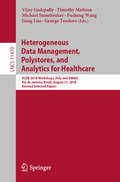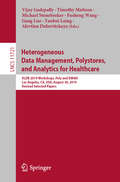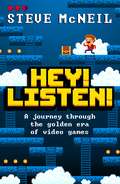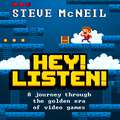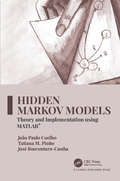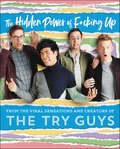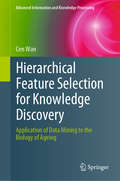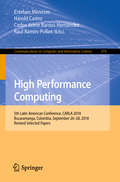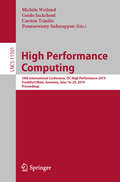- Table View
- List View
HCI in Games: First International Conference, HCI-Games 2019, Held as Part of the 21st HCI International Conference, HCII 2019, Orlando, FL, USA, July 26–31, 2019, Proceedings (Lecture Notes in Computer Science #11595)
by Xiaowen FangThis book constitutes the refereed proceedings of the First International Conference on HCI in Games, HCI-Games 2019, held in July 2019 as part of HCI International 2019 in Orlando, FL, USA. HCII 2019 received a total of 5029 submissions, of which 1275 papers and 209 posters were accepted for publication after a careful reviewing process. The 34 papers presented in this volume are organized in topical sections named: Game Design; Gaming Experience; Serious Games; and Gamification.
HCI in Mobility, Transport, and Automotive Systems: First International Conference, MobiTAS 2019, Held as Part of the 21st HCI International Conference, HCII 2019, Orlando, FL, USA, July 26-31, 2019, Proceedings (Lecture Notes in Computer Science #11596)
by Heidi KrömkerThis book constitutes the refereed proceedings of the First International Conference on HCI in Mobility, Transport, and Automotive Systems, MobiTAS 2019, held as part of the 21st International Conference on Human-Computer Interaction, HCII 2019, in Orlando, FL, USA in July, 2019. The 1274 full papers and 209 posters presented at the HCII 2019 conferences were carefully reviewed and selected from 5029 submissions. The papers cover the entire field of human-computer interaction, addressing major advances in knowledge and effective use of computers in a variety of application areas. The papers in this volume are organized in the following topical sections: interaction in autonomous and semiautonomous vehicles; driving experience; and mobility and transport.
HCI International 2019 – Late Breaking Papers: 21st HCI International Conference, HCII 2019, Orlando, FL, USA, July 26–31, 2019, Proceedings (Lecture Notes in Computer Science #11786)
by Constantine StephanidisThis year the 21st International Conference on Human-Computer Interaction, HCII 2019, which was held in Orlando, Florida, USA, in July 2019, introduced the additional option of "late-breaking work", which applied both for papers and posters with the corresponding volumes of the proceedings. The 47 late-breaking papers included in this volume were published after the conference has taken place. They were organized in the following topical sections: user experience design and evaluation; information, visualization, and decision making; virtual and augmented reality; learning and games; human and task models in HCI; and design and user experience case studies.
HCI International 2019 – Late Breaking Posters: 21st HCI International Conference, HCII 2019, Orlando, FL, USA, July 26–31, 2019, Proceedings (Communications in Computer and Information Science #1088)
by Constantine Stephanidis Margherita AntonaThis book constitutes the extended abstracts of the posters presented during the 21st International Conference on Human-Computer Interaction, HCII 2019, which took place in Orlando, Florida, in July 2019. The total of 1274 papers and 209 posters included in the 35 HCII 2019 proceedings volumes was carefully reviewed and selected from 5029 submissions. The 55 papers presented in this volume are organized in topical sections as follows: interaction design; cognitive issues in HCI; accessibility and universal access; learning and games; HCI in health and rehabilitation; HCI in business and society; big data, machine learning and visual analytics; and user studies.
HCI International 2019 - Posters: 21st International Conference, HCII 2019, Orlando, FL, USA, July 26–31, 2019, Proceedings, Part I (Communications in Computer and Information Science #1032)
by Constantine StephanidisThe three-volume set CCIS 1032, CCIS 1033, and CCIS 1034 contains the extended abstracts of the posters presented during the 21st International Conference on Human-Computer Interaction, HCII 2019, which took place in Orlando, Florida, in July 2019.The total of 1274 papers and 209 posters included in the 35 HCII 2019 proceedings volumes was carefully reviewed and selected from 5029 submissions.The 208 papers presented in these three volumes are organized in topical sections as follows: Part I: design, development and evaluation methods and technique; multimodal Interaction; security and trust; accessibility and universal access; design and user experience case studies. Part II:interacting with games; human robot interaction; AI and machine learning in HCI; physiological measuring; object, motion and activity recognition; virtual and augmented reality; intelligent interactive environments. Part III: new trends in social media; HCI in business; learning technologies; HCI in transport and autonomous driving; HCI for health and well-being.
HCI International 2019 - Posters: 21st International Conference, HCII 2019, Orlando, FL, USA, July 26–31, 2019, Proceedings, Part II (Communications in Computer and Information Science #1033)
by Constantine StephanidisThe three-volume set CCIS 1032, CCIS 1033, and CCIS 1034 contains the extended abstracts of the posters presented during the 21st International Conference on Human-Computer Interaction, HCII 2019, which took place in Orlando, Florida, in July 2019.The total of 1274 papers and 209 posters included in the 35 HCII 2019 proceedings volumes was carefully reviewed and selected from 5029 submissions.The 208 papers presented in these three volumes are organized in topical sections as follows: Part I: design, development and evaluation methods and technique; multimodal Interaction; security and trust; accessibility and universal access; design and user experience case studies. Part II:interacting with games; human robot interaction; AI and machine learning in HCI; physiological measuring; object, motion and activity recognition; virtual and augmented reality; intelligent interactive environments. Part III: new trends in social media; HCI in business; learning technologies; HCI in transport and autonomous driving; HCI for health and well-being.
HCI International 2019 - Posters: 21st International Conference, HCII 2019, Orlando, FL, USA, July 26–31, 2019, Proceedings, Part III (Communications in Computer and Information Science #1034)
by Constantine StephanidisThe three-volume set CCIS 1032, CCIS 1033, and CCIS 1034 contains the extended abstracts of the posters presented during the 21st International Conference on Human-Computer Interaction, HCII 2019, which took place in Orlando, Florida, in July 2019.The total of 1274 papers and 209 posters included in the 35 HCII 2019 proceedings volumes was carefully reviewed and selected from 5029 submissions.The 208 papers presented in these three volumes are organized in topical sections as follows: Part I: design, development and evaluation methods and technique; multimodal Interaction; security and trust; accessibility and universal access; design and user experience case studies. Part II:interacting with games; human robot interaction; AI and machine learning in HCI; physiological measuring; object, motion and activity recognition; virtual and augmented reality; intelligent interactive environments. Part III: new trends in social media; HCI in business; learning technologies; HCI in transport and autonomous driving; HCI for health and well-being.
Head First Go
by Jay McGavrenGo represents an attempt to improve on some weaknesses of traditional compiled programming languages. It de-emphasizes or removes error-prone language structures like class inheritance and exception handling. It features great concurrency support and automatic memory management (garbage collection).Existing Go books tend to be highly technical in nature, teaching all aspects of the language regardless of their relevance to beginners. This book, rather than talking about the features of Go in abstract terms, features simple, clear examples that demonstrate Go in action, and diagrams to explain difficult concepts.This book will not only teach developers basic language features, it will get them comfortable consulting error output, documentation, and search engines to find solutions to problems. It will teach all the conventions and techniques that employers expect an entry-level Go developer to know.
Head First Kotlin: A Brain-Friendly Guide
by Dawn Griffiths David GriffithsWhat will you learn from this book?Head First Kotlin is a complete introduction to coding in Kotlin. This hands-on book helps you learn the Kotlin language with a unique method that goes beyond syntax and how-to manuals and teaches you how to think like a great Kotlin developer. You’ll learn everything from language fundamentals to collections, generics, lambdas, and higher-order functions. Along the way, you’ll get to play with both object-oriented and functional programming. If you want to really understand Kotlin, this is the book for you.Why does this book look so different?Based on the latest research in cognitive science and learning theory, Head First Kotlin uses a visually rich format to engage your mind rather than a text-heavy approach that puts you to sleep. Why waste your time struggling with new concepts? This multisensory learning experience is designed for the way your brain really works.
Health and Social Care Systems of the Future: Proceedings of the Healthcare Ergonomics and Patient Safety, HEPS, 3-5 July, 2019 Lisbon, Portugal (Advances in Intelligent Systems and Computing #1012)
by Teresa Patrone Cotrim Florentino Serranheira Paulo Sousa Sue Hignett Sara Albolino Riccardo TartagliaThis book discusses how digital technology and demographic changes are transforming the patient experience, services, provision, and planning of health and social care. It presents innovative ergonomics research and human factors approaches to improving safety, working conditions and quality of life for both patients and healthcare workers. Personalized medicine, mobile and wearable technologies, and the greater availability of health data are discussed, together with challenges and evidence-based practice. Based on the Healthcare Ergonomics and Patient Safety conference, HEPS2019, held on July 3-5, 2019, in Lisbon, Portugal, this book offers a timely resource for graduate students and researchers, as well as for healthcare professionals managing service provision, planners and designers for healthcare buildings and environments, and international healthcare organizations.
Health and Wellness Measurement Approaches for Mobile Healthcare (SpringerBriefs in Applied Sciences and Technology)
by Gita Khalili Moghaddam Christopher R. LoweThis book reviews existing sensor technologies that are now being coupled with computational intelligence for the remote monitoring of physical activity and ex vivo biosignatures. In today’s frenetic world, consumers are becoming ever more demanding: they want to control every aspect of their lives and look for options specifically tailored to their individual needs. In many cases, suppliers are catering to these new demands; as a result, clothing, food, social media, fitness and banking services are all being democratised to the individual. Healthcare provision has finally caught up to this trend and is currently being rebooted to offer personalised solutions, while simultaneously creating a more effective, scalable and cost-effective system for all. The desire for personalisation, home monitoring and treatment, and provision of care in remote locations or in emerging and impoverished nations that lack a fixed infrastructure, is leading to the realisation that mobile technology might be the best candidate for achieving these goals. A combination of several technological, healthcare and financial factors are driving this trend to create a new healthcare model that stresses preventative ‘health-care’ rather than ‘sick-care’, and a shift from volume to value. Mobile healthcare (mhealth), which could also be termed the “internet of people”, refers to the integration of sensors and smartphones to gather and interpret clinical data from patients in real-time. Most importantly, with an ageing population suffering multiple morbidities, mhealth could provide healthcare solutions to enhance chronically ill patients’ quality of life.
Health Information Science: 8th International Conference, HIS 2019, Xi'an, China, October 18–20, 2019, Proceedings (Lecture Notes in Computer Science #11837)
by Hua Wang Siuly Siuly Rui Zhou Fernando Martin-Sanchez Yanchun Zhang Zhisheng HuangThis book constitutes the refereed proceedings of the 8th International Conference on Health Information Science, HIS 2019, held in Xi’an, China, in October 2019. The 14 full papers and 14 short papers presented were carefully reviewed and selected from 60 submissions. The papers are organized in topical sections named: Medical Information System and Platform; Mining Medical Data; EEG and ECG; Medical Image; Mental Health; and Healthcare.
Healthcare Quality and HIT - International Standards, China Practices (HIMSS Book Series)
by Jilan Liu Jiaxin Wang Xinyue Du Zhuo Li Mu Tian Xiangjuan KongHow Chinese hospitals have been growing and adopting international standards such as JCI and HIMSS EMRAM to fuel their advancements is not well-known to the western world. In this book, Jilan Liu, as former Principal Consultant of JCI and current Chief Executive Officer for HIMSS Greater China, presents a selection of case examples written by Chinese hospital executives and staff showcasing first-hand experiences and insights into how the leading healthcare organizations grow and continue their success in China. The case examples include Chinese hospitals who have participated in JCI accreditation and/or HIMSS EMRAM. These hospitals represent the new wave of organizations adopting international standards while accommodating the unique conditions of China.
Healthcare Service Management: A Data-Driven Systems Approach (Health Information Science)
by Li Tao Jiming LiuHealthcare service systems are of profound importance in promoting the public health and wellness of people. This book introduces a data-driven complex systems modeling approach (D2CSM) to systematically understand and improve the essence of healthcare service systems. In particular, this data-driven approach provides new perspectives on health service performance by unveiling the causes for service disparity, such as spatio-temporal variations in wait times across different hospitals.The approach integrates four methods -- Structural Equation Modeling (SEM)-based analysis; integrated projection; service management strategy design and evaluation; and behavior-based autonomy-oriented modeling -- to address respective challenges encountered in performing data analytics and modeling studies on healthcare services. The thrust and uniqueness of this approach lies in the following aspects: Ability to explore underlying complex relationships between observed or latent impact factors and service performance.Ability to predict the changes and demonstrate the corresponding dynamics of service utilization and service performance.Ability to strategically manage service resources with the adaptation of unpredictable patient arrivals.Ability to figure out the working mechanisms that account for certain spatio-temporal patterns of service utilization and performance. To show the practical effectiveness of the proposed systematic approach, this book provides a series of pilot studies within the context of cardiac care in Ontario, Canada. The exemplified studies have unveiled some novel findings, e.g., (1) service accessibility and education may relieve the pressure of population size on service utilization; (2) functionally coupled units may have a certain cross-unit wait-time relationship potentially because of a delay cascade phenomena; (3) strategically allocating time blocks in operating rooms (ORs) based on a feedback mechanism may benefit OR utilization; (4) patients’ and hospitals’ autonomous behavior, and their interactions via wait times may bear the responsible for the emergence of spatio-temporal patterns observed in the real-world cardiac care system. Furthermore, this book presents an intelligent healthcare decision support (iHDS) system, an integrated architecture for implementing the data-driven complex systems modeling approach to developing, analyzing, investigating, supporting and advising healthcare related decisions. In summary, this book provides a data-driven systematic approach for addressing practical decision-support problems confronted in healthcare service management. This approach will provide policy makers, researchers, and practitioners with a practically useful way for examining service utilization and service performance in various ``what-if" scenarios, inspiring the design of effectiveness resource-allocation strategies, and deepening the understanding of the nature of complex healthcare service systems.
Hello Swift!: iOS app programming for kids and other beginners
by Tanmay Bakshi Puneet BakshiSummaryHello Swift! is a how-to guide to programming iOS Apps with the Swift language, written from a kid's perspective. This approachable, well-illustrated, step-by-step guide takes you from beginning programming concepts all the way through developing complete apps. (Adults will like it too!)Purchase of the print book includes a free eBook in PDF, Kindle, and ePub formats from Manning Publications.About the TechnologyIt's fun to play games and explore new things on your iPhone. How amazing would it be to create your own apps? With a little practice, you can! Apple's Swift language, along with special coding playgrounds and an easy-to-use programming environment, make it easier than ever. Take it from author Tanmay Bakshi, who started programming when he was just five years old.About the BookHis book, Hello Swift! iOS app programming for kids and other beginners, teaches you how to write apps for iPhones and iOS devices step by step, starting with your first line of Swift code. Packed with dozens of apps and special exercises, the book will teach you how to program by writing games, solving puzzles, and exploring what your iPhone can do. Hello Swift! gets you started. Where you go next is up to you!What's insideCrystal-clear explanations anyone can understandKid-friendly examples, including games and puzzlesLearn by doing—you'll build dozens of small appsExercises that encourage critical thinkingAbout the ReaderWritten for kids who want to learn how to program. (Psst! Adults like it, too.)About the AuthorTanmay Bakshi had his first app on the iOS App Store at the age of nine. He's now the youngest IBM Champion, a Cloud Advisor, Watson Developer, TED Speaker, and Manning author!Table of ContentsGet ready to build apps with Swift!Create your first appYour first real Swift code using variablesI/O laboratoryComputers make decisions, too!Let computers do repetitive workKnitting variables into arrays and dictionariesReuse your code: Clean it with function detergentReduce your code: Use less, do more with class detergentReading and writing filesFrameworks: Bookshelves of classesSpriteKit: Fun animation timeTime to watch your WatchKit codeContinuing your journey with Swift
A Hetero-functional Graph Theory for Modeling Interdependent Smart City Infrastructure
by Wester C. Schoonenberg Inas S. Khayal Amro M. FaridCities have always played a prominent role in the prosperity of civilization. Indeed, every great civilization we can think of is associated with the prominence of one or more thriving cities. And so understanding cities -- their inhabitants, their institutions, their infrastructure -- what they are and how they work independently and together -- is of fundamental importance to our collective growth as a human civilization. Furthermore, the 21st century “smart” city, as a result global climate change and large-scale urbanization, will emerge as a societal grand challenge. This book focuses on the role of interdependent infrastructure systems in such smart cities especially as it relates to timely and poignant questions about resilience and sustainability. In particular, the goal of this book is to present, in one volume, a consistent Hetero-Functional Graph Theoretic (HFGT) treatment of interdependent smart city infrastructures as an overarching application domain of engineering systems. This work may be contrasted to the growing literature on multi-layer networks, which despite significant theoretical advances in recent years, has modeling limitations that prevent their real-world application to interdependent smart city infrastructures of arbitrary topology. In contrast, this book demonstrates that HFGT can be applied extensibly to an arbitrary number of arbitrarily connected topologies of interdependent smart city infrastructures. It also integrates, for the first time, all six matrices of HFGT in a single system adjacency matrix. The book makes every effort to be accessible to a broad audience of infrastructure system practitioners and researchers (e.g. electric power system planners, transportation engineers, and hydrologists, etc.). Consequently, the book has extensively visualized the graph theoretic concepts for greater intuition and clarity. Nevertheless, the book does require a common methodological base of its readers and directs itself to the Model-Based Systems Engineering (MBSE) community and the Network Science Community (NSC). To the MBSE community, we hope that HFGT will be accepted as a quantification of many of the structural concepts found in model-based systems engineering languages like SysML. To the NSC, we hope to present a new view as how to construct graphs with fundamentally different meaning and insight. Finally, it is our hope that HFGT serves to overcome many of the theoretical and modeling limitations that have hindered our ability to systematically understand the structure and function of smart cities.
Heterogeneous Data Management, Polystores, and Analytics for Healthcare: VLDB 2018 Workshops, Poly and DMAH, Rio de Janeiro, Brazil, August 31, 2018, Revised Selected Papers (Lecture Notes in Computer Science #11470)
by Vijay Gadepally Timothy Mattson Michael Stonebraker Fusheng Wang Gang Luo George TeodoroThis book constitutes the refereed post-conference proceedings of International Workshops: Polystores and other Systems for Heterogeneous Data, Poly 2018, and Data Management and Analytics for Medicine and Healthcare, DMAH 2018, in Rio de Janeiro, Brazil, in August 2018, held in conjunction with the 44th International Conference on Very Large Data Bases, VLDB 2018. The 11 regular papers presented together with 2 invited papers and 1 abstract of a keynote talk were carefully reviewed and selected from 16 initial submissions. The Poly 2018 Workshop focus on growing a larger and more diverse research agenda around data system solutions for heterogeneous data. The DMAH 2018 Workshop aims to foster exchange of information and discussions on innovative data management and analytics technologies.
Heterogeneous Data Management, Polystores, and Analytics for Healthcare: VLDB 2019 Workshops, Poly and DMAH, Los Angeles, CA, USA, August 30, 2019, Revised Selected Papers (Lecture Notes in Computer Science #11721)
by Vijay Gadepally Timothy Mattson Michael Stonebraker Fusheng Wang Gang Luo Yanhui Laing Alevtina DubovitskayaThis book constitutes the refereed post-conference proceedings for the VLBD conference workshops entitled: Towards Polystores That Manage Multiple Databases, Privacy, Security and/or Policy Issues for Heterogenous Data (Poly 2019) and the Fifth International Workshop on Data Management and Analytics for Medicine and Healthcare (DMAH 2019), held in Los Angeles, CA, USA, in August 2019, in conjunction with the 45th International Conference on Very Large Data Bases, VLDB 2019. The 20 regular papers presented together with 2 keynote papers were carefully reviewed and selected from 31 initial submissions. The papers are organized in topical sections named:Poly 2019: Privacy, Security and/or Policy Issues for Heterogenous Data; Building Polystore Systems.DMAH 2019: Database Enabled Biomedical Research; AI for Healthcare; Knowledge Discovery from Unstructured Biomedical Data; Blockchain and Privacy Preserving Data Management.
Hey! Listen!: A journey through the golden era of video games
by Steve McNeilFor fans of Daniel Hardcastle's Fuck Yeah!, Videogames and Retro Tech by peter leigh.Equal parts hilarious and informative, Hey! Listen! should be in every gamer's library. - Lucy James, (Gamespot) An informative, accessible romp through the early years of the games industry. All hail Il pirata pallido; the gaming hero we never knew we needed.- Adam Rosser BBC Radio 5LiveSteve McNeil is funny, knowledgeable, and a massive, shameless, nerd. His brilliant book reminded me just how much of my life I've wasted. If the Golden Age of Gaming is a horse, then Steve's book is the stable. - Paul Rose (aka Mr Biffo), DigitiserA thoroughly enjoyable look at the early days of video gaming - comprehensive and fun. Loved it! - Stuart Ashen (aka ashens)The 'A La Recherche du Temps Perdu' of the gaming community. The 'A La Recherche du Temps Pew-Pew-Pew', as it were. - Dara O'BriainIf 'Games Master' was a Nobel title passed on through the ages like 'Duke of York' or 'Rear of the Year' rather than simply the name of a 90s magazine and TV show then Steve McNeil would surely be the current holder of the esteemed position. What I'm saying is, he knows a LOT about games... - Scroobius PipTaking us on a historical journey from the very early days all the way through to the late 1990s the book tells the stories of the men and women behind some of the most wonderful (and occasionally awful) games of the golden age, the fierce rivalries, bizarre business practices and downright bonkers risks taken during the pioneering days of computer and video gaming. This informal yet extremely well-researched book manages to educate and entertain in equal measure and this - dare I say - well-informed retrohead actually learnt a good deal. A thoroughly enjoyable read! - Mark Howlett (aka Lord Arse)Hugely funny, and full of fantastic facts about the history of video games. But enough about me; Steve's book is also quite good. - Ellie Gibson, EurogamerA hilarious history of the golden period of computer games from the creator of Dara O'Briain's Go 8 Bit.It is fair to say Steve McNeil likes video games. He took a Nintendo Wii with him on his honeymoon (obviously), and spent so much time playing smartphone games in bed in the dark that he got eye strain and had to wear an eye patch. The locals nicknamed him 'the pale pirate'.Steve's obsession with video games can be traced back to the golden period from the early 70s to the late 90s. In this book he will delve into these games - from the appallingly bad to the breathtakingly good. He will also take us through the nerdy geniuses who created them, their fierce rivalries and risks often leading to some of the most farcical moments in the history of entertainment.This is a story of obsession, full of tales of Space Invaders, Donkey Kong, Mario, Sonic, Wolfenstein 3D, Worms and many more. It will also answer important questions about the golden age. Questions like: Why did Namco feel they had to change the name of Puck-Man to Pac-Man because they were worried about graffiti, when Nintendo were more than happy to bring out Duck Hunt?Joysticks at the ready. Let's do a gaming!
Hey! Listen!: A journey through the golden era of video games
by Steve McNeilFor fans of Daniel Hardcastle's Fuck Yeah!, Videogames and Retro Tech by peter leigh.Equal parts hilarious and informative, Hey! Listen! should be in every gamer's library. - Lucy James, (Gamespot) An informative, accessible romp through the early years of the games industry. All hail Il pirata pallido; the gaming hero we never knew we needed.- Adam Rosser BBC Radio 5LiveSteve McNeil is funny, knowledgeable, and a massive, shameless, nerd. His brilliant book reminded me just how much of my life I've wasted. If the Golden Age of Gaming is a horse, then Steve's book is the stable. - Paul Rose (aka Mr Biffo), DigitiserA thoroughly enjoyable look at the early days of video gaming - comprehensive and fun. Loved it! - Stuart Ashen (aka ashens)The 'A La Recherche du Temps Perdu' of the gaming community. The 'A La Recherche du Temps Pew-Pew-Pew', as it were. - Dara O'BriainIf 'Games Master' was a Nobel title passed on through the ages like 'Duke of York' or 'Rear of the Year' rather than simply the name of a 90s magazine and TV show then Steve McNeil would surely be the current holder of the esteemed position. What I'm saying is, he knows a LOT about games... - Scroobius PipTaking us on a historical journey from the very early days all the way through to the late 1990s the book tells the stories of the men and women behind some of the most wonderful (and occasionally awful) games of the golden age, the fierce rivalries, bizarre business practices and downright bonkers risks taken during the pioneering days of computer and video gaming. This informal yet extremely well-researched book manages to educate and entertain in equal measure and this - dare I say - well-informed retrohead actually learnt a good deal. A thoroughly enjoyable read! - Mark Howlett (aka Lord Arse)Hugely funny, and full of fantastic facts about the history of video games. But enough about me; Steve's book is also quite good. - Ellie Gibson, EurogamerA hilarious history of the golden period of computer games from the creator of Dara O'Briain's Go 8 Bit.It is fair to say Steve McNeil likes video games. He took a Nintendo Wii with him on his honeymoon (obviously), and spent so much time playing smartphone games in bed in the dark that he got eye strain and had to wear an eye patch. The locals nicknamed him 'the pale pirate'.Steve's obsession with video games can be traced back to the golden period from the early 70s to the late 90s. In this book he will delve into these games - from the appallingly bad to the breathtakingly good. He will also take us through the nerdy geniuses who created them, their fierce rivalries and risks often leading to some of the most farcical moments in the history of entertainment.This is a story of obsession, full of tales of Space Invaders, Donkey Kong, Mario, Sonic, Wolfenstein 3D, Worms and many more. It will also answer important questions about the golden age. Questions like: Why did Namco feel they had to change the name of Puck-Man to Pac-Man because they were worried about graffiti, when Nintendo were more than happy to bring out Duck Hunt?Joysticks at the ready. Let's do a gaming!
Hidden Markov Models: Theory and Implementation using MATLAB®
by José Boaventura-Cunha João Coelho Tatiana PinhoThis book presents, in an integrated form, both the analysis and synthesis of three different types of hidden Markov models. Unlike other books on the subject, it is generic and does not focus on a specific theme, e.g. speech processing. Moreover, it presents the translation of hidden Markov models’ concepts from the domain of formal mathematics into computer codes using MATLAB®. The unique feature of this book is that the theoretical concepts are first presented using an intuition-based approach followed by the description of the fundamental algorithms behind hidden Markov models using MATLAB®. This approach, by means of analysis followed by synthesis, is suitable for those who want to study the subject using a more empirical approach. <p><P>Key Selling Points: <li>Presents a broad range of concepts related to Hidden Markov Models (HMM), from simple problems to advanced theory <li>Covers the analysis of both continuous and discrete Markov chains <li>Discusses the translation of HMM concepts from the realm of formal mathematics into computer code <li>Offers many examples to supplement mathematical notation when explaining new concepts
The Hidden Power of F*cking Up
by The Try Guys Keith Habersberger Zach Kornfeld Eugene Lee Yang#1 NEW YORK TIMES BESTSELLERThe Try Guys deliver their first book—an inspirational self-improvement guide that teaches you that the path to success is littered with humiliating detours, embarrassing mistakes, and unexpected failures.To be our best selves, we must become secure in our insecurities. In The Hidden Power of F*cking Up, The Try Guys - Keith, Ned, Zach, and Eugene - reveal their philosophy of trying: how to fully embrace fear, foolishness, and embarrassment in an effort to understand how we all get paralyzed by a fear of failure. They’ll share how four shy, nerdy kids have dealt with their most poignant life struggles by attacking them head-on and reveal their - ahem - sure-fail strategies for achieving success.But they’re not just here to talk; they’re actually going to put their advice to work. To demonstrate their unique self-improvement formula, they’ll each personally confront their deepest insecurities. A die-hard meat-lover goes vegan for the first time. A straight-laced father transforms into a fashionista. A perpetually single sidekick becomes the romantic lead. A child of divorce finally grows more intimate with his family. Through their insightful, emotional journeys and surprising, hilarious anecdotes, they’ll help you overcome your own self-doubt to become the best, most f*cked up version of yourself you can be!
Hierarchical Feature Selection for Knowledge Discovery: Application of Data Mining to the Biology of Ageing (Advanced Information and Knowledge Processing)
by Cen WanThis book is the first work that systematically describes the procedure of data mining and knowledge discovery on Bioinformatics databases by using the state-of-the-art hierarchical feature selection algorithms. The novelties of this book are three-fold. To begin with, this book discusses the hierarchical feature selection in depth, which is generally a novel research area in Data Mining/Machine Learning. Seven different state-of-the-art hierarchical feature selection algorithms are discussed and evaluated by working with four types of interpretable classification algorithms (i.e. three types of Bayesian network classification algorithms and the k-nearest neighbours classification algorithm). Moreover, this book discusses the application of those hierarchical feature selection algorithms on the well-known Gene Ontology database, where the entries (terms) are hierarchically structured. Gene Ontology database that unifies the representations of gene and gene products annotation provides the resource for mining valuable knowledge about certain biological research topics, such as the Biology of Ageing. Furthermore, this book discusses the mined biological patterns by the hierarchical feature selection algorithms relevant to the ageing-associated genes. Those patterns reveal the potential ageing-associated factors that inspire future research directions for the Biology of Ageing research.
High Performance Computing: 5th Latin American Conference, CARLA 2018, Bucaramanga, Colombia, September 26–28, 2018, Revised Selected Papers (Communications in Computer and Information Science #979)
by Esteban Meneses Harold Castro Carlos Jaime Barrios Hernández Raul Ramos-PollanThis book constitutes the proceedings of the 5th Latin American Conference, CARLA 2018, held in Bucaramanga, Colombia, in September 2018.The 24 papers presented in this volume were carefully reviewed and selected from 38 submissions. They are organized in topical sections on: Artificial Intelligence; Accelerators; Applications; Performance Evaluation; Platforms and Infrastructures; Cloud Computing.
High Performance Computing: 34th International Conference, ISC High Performance 2019, Frankfurt/Main, Germany, June 16–20, 2019, Proceedings (Lecture Notes in Computer Science #11501)
by Michèle Weiland Guido Juckeland Carsten Trinitis Ponnuswamy SadayappanThis book constitutes the refereed proceedings of the 34th International Conference on High Performance Computing, ISC High Performance 2019, held in Frankfurt/Main, Germany, in June 2019.The 17 revised full papers presented were carefully reviewed and selected from 70 submissions. The papers cover a broad range of topics such as next-generation high performance components; exascale systems; extreme-scale applications; HPC and advanced environmental engineering projects; parallel ray tracing - visualization at its best; blockchain technology and cryptocurrency; parallel processing in life science; quantum computers/computing; what's new with cloud computing for HPC; parallel programming models for extreme-scale computing; workflow management; machine learning and big data analytics; and deep learning and HPC.
